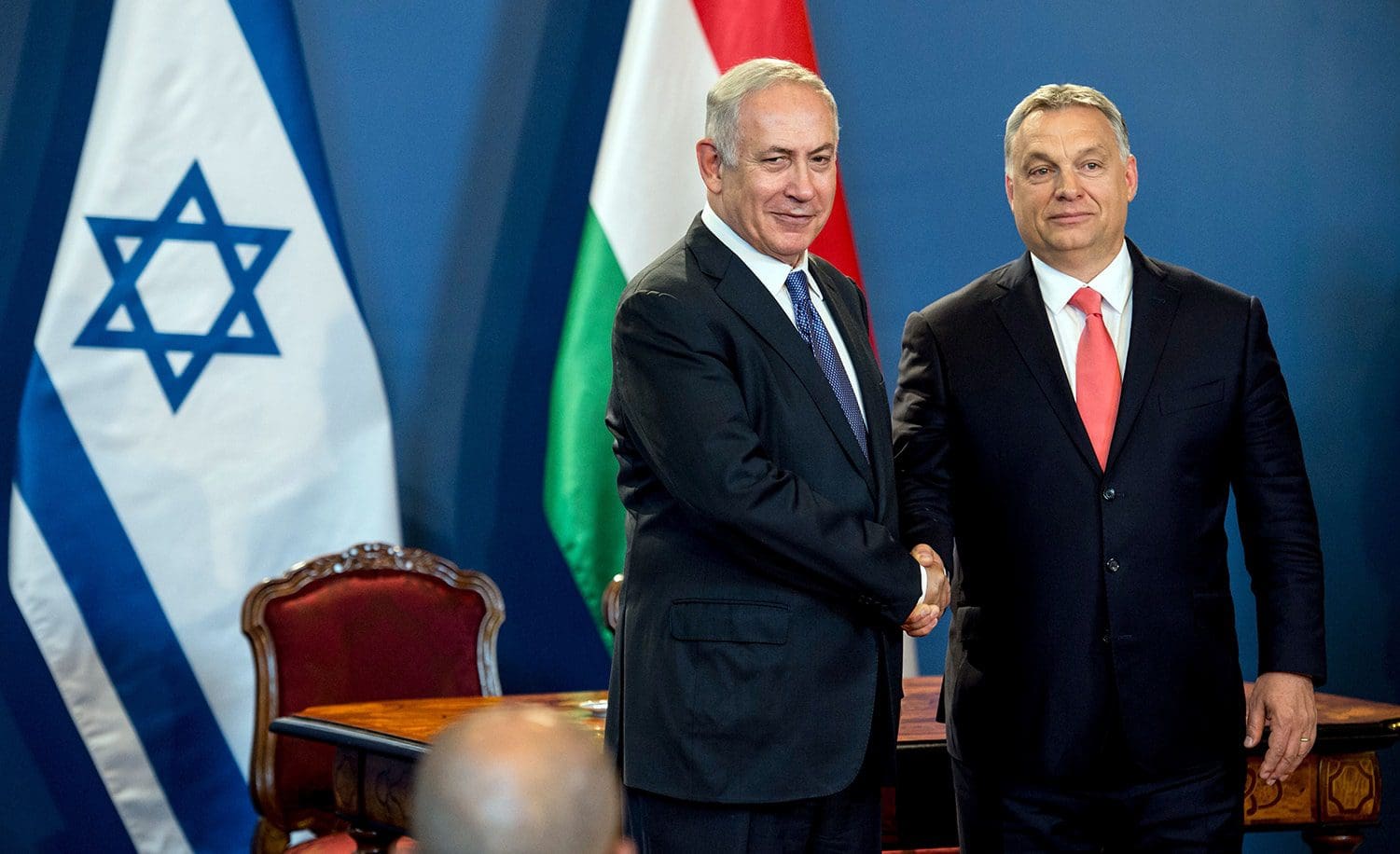Hungary established diplomatic relations with the newly founded State of Israel in 1948, but, bowing to pressure from Moscow, it (as part of the Eastern Bloc) was forced to terminate all relations with the Jewish state in 1967. However, in September 1989, immediately after the change of regime, Hungary re-established full diplomatic relations with Israel.
For two decades, relations between the two countries were neutral and pragmatic, focusing on economic relations, culture, and, of course, the Hungarian Jewish community, which with a population of 75-100,000 is the largest in Central Europe.
The real change in the relations between the two countries began in the early 2010s, when a series of international and domestic events occurred which brought the two states, or rather their two leaders, into closer harmony than ever before. In 2009 the Benjamin Netanyahu-led, right-wing Likud party formed a coalition government, while in Hungary, Fidesz won an overwhelming majority of parliamentary seats in the 2010 elections.
In 2005, Viktor Orbán and his party were in opposition to the left-wing government. Preparing for the next election campaign, he was persuaded to make a visit in Israel where he met the then finance minister, Netanyahu. The meeting in Jerusalem marked a turning point for Orbán, both in terms of his approach to the Jewish state and to Netanyahu himself. He saw in Netanyahu a like-minded counterpart who, like Orbán himself, was preparing to win election as prime minister for the second time. Orbán also admired how the Jewish state had established itself as a solidly capitalist, Western state in the region, and noted the proud, deeply felt national identity of its people. Likewise, his Christian faith and broad knowledge of biblical references meant—according to those present—that he was able to identify almost all the locations in the Holy Land.
Fidesz and Likud are both right-aligned, nationalist parties which operate in a polarized political environment. However, though the two parties made informal connections in the first decade of the millennium, it is rather the two like-minded leaders who have latterly succeeded in forging closer ties between their countries.
Both leaders were re-elected prime minister at roughly the same time, not long before significant changes in both international and regional politics.
The “Arab Spring” did not live up to the high hopes first placed in it, and instead of bringing a democratic shift and increased social justice, merely led to the chaos of fragile and failed states, which in turn had an impact on Hungary’s relationship with the rest of Europe, and with Israel. Political uncertainty and collapsed states compelled Hungary to change its foreign policy strategy in the MENA (Middle East and North Africa) region. To that point, Hungarian foreign policy had sought to plot a middle course between the Arab states (and Palestinians) and Israel, but after the “Arab Spring” the country found itself in need of a more reliable and stable regional ally, and one with peerless connection to the United States.
Meanwhile, Netanyahu was faced with a task as old as the state of Israel: to find dependable allies for his isolated nation. However, so long as the matter of Palestine remains unsolved—at least to the satisfaction of the EU—most European states will remain wary of closer links with Israel, thus closing off the possibility of partnership with a state which is a world leader in innovation, technology, security, and military industrial development, as well as a good ideological match.
According to Tamir Wertzberger, international relations coordinator for Likud in Budapest, 2015 marked another turning point in relations between the two countries. Netanyahu’s party won a huge victory that year, giving it the opportunity to set up a foreign affairs office, and to institutionalize inter-party relations between Likud and Fidesz.
Netanyahu has found new allies among Central-European nations who adopt a more pragmatic, realpolitik stance towards Israel, welcoming Jewish intellectual capital, innovations, and military technology. Moreover, they are part of the EU, and as such, can play an important role in softening the bloc’s largely anti-Israeli position.
However, 2015 was also the year when mass immigration reached the borders of the European Union, causing a long-term security, social, and legal crisis which has divided states of the EU, perhaps permanently. Hungary, adopting an anti-immigration approach, closed its southern borders and started a campaign against illegal migration and the related risk of terrorism, for which the country has faced sustained condemnation from the West and isolation within the EU. Hungary and Israel suddenly found themselves on the same page—and opposed to the EU—in several key regards, including security, identity, and sovereignty. Israel understood Hungary’s security and social concerns related to migration, and Hungary underwent ill-informed international criticism of a sort Israel already had long experience of , it created common ground for greater cooperation between the two countries, and for joint responses to one-sided judgements.
Hungary has vetoed many resolutions targeting the Jewish state in both the UN and EU
including one which sought to declare Israeli settlements illegal, or to condemn the United States for moving its embassy to Jerusalem. Hungary also opposes the BDS (Boycott, Divestment, Sanctions) movement, which calls Israel an “apartheid state”, and rejects a ban on kosher slaughter, thus helping to preserve Europe’s Jewish-Christian heritage. Following the brave US move, Hungary opened a trade office in Jerusalem, a gesture towards both Israel and the US. The country also supported Trump’s Middle East peace plan. The Hungarian government has announced a zero-tolerance policy towards anti-Semitism, and has revised hate-speech legislation, while allocating significant financial support to Hungarian Jewish communities.
Relations between Israel and Hungary include substantial cooperation in the fields of economic and military development, as well as in science and innovation. Israel’s traditions of innovation and state-of-the-art technology have begun to influence Hungary ever more profoundly, even in the field of space exploration. Hungary has also announced the purchase of the radar system used in Israel’s so-called ‘Iron Dome’ aerial defence system.
For Hungary, friendship with Israel goes far beyond a mere convergence of interests. It is rather a matter of ideological kinship and shared values, derived from not merely from the similar location of the two governing parties on the left-right spectrum, but from two charismatic leaders’ philosophies, analogous political careers, and aspirations. The relationship between the two prime ministers based on more than just personal rapport and friendship: they are, in a sense, also ‘brother in arms’. ‘It’s the same European establishment that opposes Orbán’s Hungary which also opposes Netanyahu’s Israel’ – noted Slomo Köves, leader of the of the Unified Hungarian Jewish Congregation.








